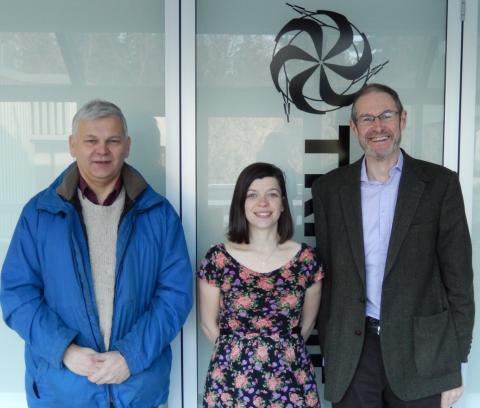
Gone are the days when significant scientific advances are made by a single researcher in an isolated lab. Today, science depends upon collaboration, the fruitful exchange of resources and knowledge in the quest for a common goal. Last month, a group of radioisotope and accelerator scientists from Scotland visited TRIUMF, investigating possible avenues for such collaboration. Prof. Dino Jaroszynski, Prof. David Wyper, and Dr. Sally Pimlott spent three days at TRIUMF in meetings with the Nuclear Medicine and Accelerator Divisions, exploring multiple common areas of interest including medical isotope production, the development of new radioisotopes, and the advancement of accelerator technology.
The three Scots are currently pooling their talents on a project using laser-driven accelerators to produce radioisotopes for medical imaging. Wyper is a medical physicist and director of SINAPSE, a partnership of six Scottish universities working together to advance medical imaging technology in Scotland. Pimlott is a radiochemist who works as a translational researcher for U.K.'s National Health Service in Glasgow. Jaroszynski is a professor at the University of Strathclyde in Glasgow and Director of the Scottish Centre for the Application of Plasma-Based Accelerators (SCAPA).
"In the field of medical imaging, it is becoming increasingly important for groups who have different skills to get together and join these skills up," explains Prof. Wyper. "Knowing that TRIUMF is one of the world's leading centres in accelerator physics, we have a common interest and complementary skills. That's really what we set out to explore."
The trio was interested in TRIUMF's well-established positron emission tomography (PET) program and associated expertise in accelerator-based medical isotope production. Based on this expertise, TRIUMF seeks to address the worldwide medical isotope shortage through cyclotron-direct production of non-PET isotopes, such as Technetium-99m (the most widely-used medical isotope). TRIUMF scientists are improving target technology and accelerator development with the goal of establishing a nationwide network of small in-hospital cyclotrons to produce medical isotopes, removing the need for aging, centralized nuclear reactors. Currently, SINAPSE is exploring the possibility of implementing such a system in Scotland. Going forward, they will continue to share data and experiences with the TRIUMF Nuclear Medicine division as they conduct their research.
Jaroszynski, Pimlott, and Wyper were also interested in the technology TRIUMF has developed to make new radiotherapeutic isotopes, such as At-209, which could have a variety of different applications in molecular imaging and medical research. "We're interested in using that technology and translating it over into Scotland," explains Dr. Pimlott, who specializes in the development of new imaging probes for cancer and neurological research. The development of rare isotopes with different half-lives expand researchers' capabilities to image various biological processes.
The Scottish contingent shared with TRIUMF their expertise in the production of radioisotopes through laser-plasma accelerators. Laser-driven plasma accelerators are much more compact than conventional accelerators, widening their potential applications. TRIUMF and the University of Strathclyde are also working to establish collaboration on a prestigious international project at CERN called AWAKE. The AWAKE collaboration proposes to create a new plasma wakefield accelerator driven by the Super Proton Synchrotron (SPS), the second-largest machine in CERN's accelerator complex. The project, still in its exploratory phase, holds exciting possibilities for transforming the future of particle acceleration.
"If we can demonstrate accelerating these particles using the plasma driven by the proton beam from the feeder ring, this could be the next generation of accelerator technology," explains Prof. Jaroszynski. "We want to be part of the next big step." To this end, TRIUMF and Strathclyde are considering possibilities for working together on diagnostic testing and research of this novel project.
The Scottish group also shares TRIUMF's commitment to providing student opportunities, and the next step will be a studentship program between the two institutions. This spring, TRIUMF will welcome a postdoctoral researcher and a graduate student from Scotland, serving as a concrete point of contact between the two groups.
The short visit has uncovered many avenues for future cooperation."I think there's a genuine common interest. That's one of the things that attracted us here - TRIUMF seems open to these new ideas and new activities," reflects Jaroszynski. "The many laboratories and companies working together at TRIUMF show that this model of building relationships works extremely well."
TRIUMF looks forward to the interesting possibilities on the horizon as they continue to collaborate with Profs. Jaroszynski, Wyper, and Dr. Pimlott.
-Lindsay Kroes, Communications Assistant
